List of rivers of the Czech Republic
Czech language distinguishes between larger (river) and smaller (stream, creek, brook etc.) watercourses; the respective nouns being řeka (feminine, "river") and potok (masculine, "stream"). River names are mostly self-standing nouns and not accompanied with the generic word for river (except when confusion might arose because name is shared with some towns, e.g. Jihlava; in such cases one sometimes says řeka Jihlava). In contrast, stream names mostly consist of two words because they contain an adjective (usually stemming from physical properties (e.g. Černý potok-"Black Stream"), usage (e.g. Mlýnský potok-"Mill Stream") or derived from location through which it flows (e.g. Rakovnický potok-"Rakovník Stream")). These two-word names are used as a whole, the word potok making an inseparable part of the name (i.e. Mlýnský potok, not just Mlýnský). There are also streams with one-word names (either masculine or feminine) akin to rivers (e.g. Botič or Modla) but they are simply considered streams due to their small size. In such cases the word potok is optional and precedes the name (potok Modla).


This is a list of rivers of the Czech Republic.
Drainage basins


As the Main European Watershed passes through the Czech Republic, there are three directions and principal areas of drainage (very roughly overlapping with historical territories of Bohemia, Moravia and Silesia): Almost 2/3 of the country is drained in NW direction through the Elbe into the North Sea. Morava River flowing towards SE collects water from eastern regions of the Czech Republic and discharges into Danube which flows to the Black Sea. The northeast and some northern portions of the territory is drained by the Oder and its tributaries like Lausitzer Neisse into the Baltic Sea. The corresponding watershed tripoint with a marker for symbolic "roof of Europe" (50°9'27"N 16°47'27"E) is located at Czech-Polish border on Mt. Klepý near Dolní Morava in Králický Sněžník Mountains.
The catchment area of the Elbe down to Czech-German border in Hřensko/Schöna covers 51,394 square kilometres (19,843 sq mi). This figure includes upper courses of some tributaries starting in neighbouring countries. The area solely within Czech borders is slightly smaller and this is the figure given in the following table, which shows Czech territory divided after drainage basins.
| River | level 1 | level 2 | level 3 |
|---|---|---|---|
| Elbe | 49,933[1] | ||
| Vltava | 27,006.70[2] | ||
| Ohře | 4,601.05[3] | ||
| Danube | 21,736[4] | ||
| Morava | 20,692.4[5] | ||
| Thaya | 11,164.7[6] | ||
| Oder | 7,217 | ||
| total (km²) | 78,886 |
Table of rivers
While the Elbe is the longest Czech-related river when measured through its overall length (i.e. including its lower course in Germany), its tributary the Vltava surpasses it as the longest river within the territory of the Czech Republic itself. (In fact the Vltava also carries more water than the Elbe at their confluence.)
Hierarchical list
Rivers not located themselves within the Czech Republic but possessing tributaries originating on the Czech territory are shown in strikethrough italics. Rivers over 100 km long or having average discharge greater than 10 m³/s are emphasized in bold.
Rivers flowing to the North Sea (Elbe basin)
- tributaries joining the Elbe during its course through Germany (from area along Czech-German border in NW of the country, esp. from Ore Mountains)
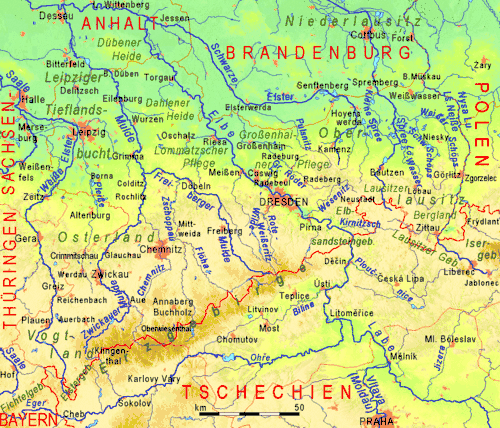


- Elbe (Czech: Labe, German: Elbe; leaves the Czech Republic at Hřensko, empties into the North Sea)
Havel- Spree (c. 1 km section of upper course in Fukov salient; in Lusatian Highlands)
Saale- Rokytnice (German: Südliche Regnitz; originates in Fichtel Mountains)
- White Elster (Czech: Bílý Halštrov, German: Weiße Elster; originates in the Fichtel Mountains)
MuldeZwickauer Mulde- Černá (German: Schwarzwasser; originates in Ore Mountains)
- Moldavský potok (German: Freiberger Mulde; originates in Ore Mountains)
Zschopau- Polava (German: Pöhlbach; originates in Ore Mountains)
- Přísečnice (German: Preßnitz; originates in Ore Mountains)
- Černá voda (German: Schwarzwasser)
- Flájský potok (German: Flöha; originates in Ore Mountains)
Weißeritz- Divoká Bystřice (German: Wilde Weißeritz; originates in Ore Mountains)
- Rašelinový potok
- Divoká Bystřice (German: Wilde Weißeritz; originates in Ore Mountains)
Müglitz- Mohelnice (German: Weiße Müglitz; originates in Ore Mountains)
- Černý potok (German: Schwarzbach, Schwarze Müglitz)
- Rybný potok (German: Gottleuba; originates in Ore Mountains)
- Ostrovská Bělá (German: Biela; originates in Elbe Sandstone Mountains)
Lachsbach- Vilémovský potok (a.k.a. Sebnice, German: Sebnitz; originates in Elbe Sandstone Mountains)
- Křinice (German: Kirnitzsch; originates in Elbe Sandstone Mountains)
- tributaries joining the Elbe within Czech Republic, i.e. rivers from major part of Bohemia







- Kamenice (in Hřensko)
- Ploučnice (in Děčín)
- Jílovský potok (in Děčín)
- Bílina (in Ústí nad Labem)
- Srpina
- Modla (in Lovosice)
- Ohře (German: Eger; in Litoměřice)
- Čepel (in Doksany)
- Chomutovka (below Postoloprty)
- Hasina
- Blšanka
- Liboc (in Libočany)
- Bystřice
- Teplá (in Karlovy Vary)
- Otročínský potok
- Pramenský potok
- Rolava (in Karlovy Vary)
- Svatava (German: Zwota, Zwodau; in Sokolov)
- Libocký potok (in Kynšperk nad Ohří)
- Odrava (German: Wondreb)
- Plesná (German: Fleißenbach)
- Liběchovka (in Liběchov)
- Pšovka (in Mělník)
- Vltava (in Mělník; Vltava is the name given to Teplá Vltava after its confluence with Studená Vltava)
- Bakovský potok
- Zákolanský potok (in Kralupy nad Vltavou)
- Únětický potok (in Roztoky)
- Śárecký potok (in Prague-Dejvice)
- Rokytka (in Prague-Libeň)
- Brusnice (in Prague)
- Motolský potok (in Prague-Smíchov)
- Botič (in Prague-Vyšehrad)
- Berounka (in Prague-Lahovice; Berounka is the name given to lower Mže following its confluence with Radbuza)
- Sázava (in Davle)
- Kocába
- Mastník
- Otava (under Zvíkov Castle; Otava originates at confluence of Vydra and Křemelná)
- Lomnice
- Skalice
- Blanice (a.k.a. Vodňanská Blanice)
- Volyňka (in Strakonice)
- Spůlka
- Ostružná
- Křemelná
- Vydra
- Lomnice
- Lužnice (German: Lainsitz; in Týn nad Vltavou)
- Smutná (in Bechyně)
- Nežárka (in Veselí nad Lužnicí; Nežárka originates at confluence of Kamenice and Žirovnice)
- Kamenice
- Žirovnice
- Dračice (German: Reißbach)
- Malše (German: Maltsch; in České Budějovice)
- Teplá Vltava (headwater of Vltava and the whole Elbe-Vltava system)
- Studená Vltava (German: Kalte Moldau, Altwasser)
- Výmola
- Jizera (Polish: Izera)
- Klenice (in Mladá Boleslav)
- Bělá
- Zábrdka
- Mohelka
- Žehrovka
- Libuňka (in Turnov)
- Oleška (in Semily)
- Kamenice
- Mumlava
- Vlkava
- Výrovka
- Šembera
- Mrlina (in Nymburk)
- Cidlina (in Libice nad Cidlinou)
- Bystřice (in Chlumec nad Cidlinou)
- Javorka
- Klejnárka
- Vrchlice
- Doubrava
- Chrudimka (in Pardubice)
- Novohradka
- Loučná
- Orlice (in Hradec Králové; Orlice originates through confluence of Divoká Orlice and Tichá Orlice)
- Dědina (in Třebechovice pod Orebem)
- Tichá Orlice
- Třebovka (in Ústí nad Orlicí)
- Divoká Orlice (Polish: Dzika Orlica)
- Metuje (in Jaroměř)
- Úpa (in Jaroměř)
- Ličná
- Malá Úpa
- Malé Labe
- Bílé Labe
Rivers flowing to the Baltic Sea (Oder basin)
- tributaries joining the Oder during its course through Poland (from northern parts of Bohemia (esp. around city of Liberec - Frýdlant Hills, Zittau Basin and NW slopes of Izera Mountains) and NW portion of Czech Silesia (esp. Jeseník District))
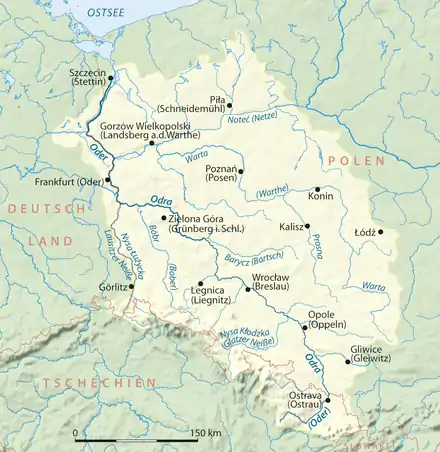
_-_Mikulovice.jpg.webp)


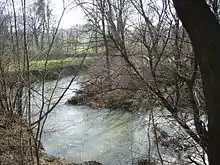

- Oder (Czech: Odra, Polish: Odra; leaves the Czech Republic at Bohumín, empties into the Baltic Sea)
- Lužická Nisa (German: Lausitzer Neiße, Polish: Nysa Łużycka)
- Bóbr (Polish: Bóbr; it originates in eastern Karkonosze Mountains - only source with c. 2.5 km of uppermost course are located in the Czech Republic)
Nysa Kłodzka- Osoblaha (Polish: Osobłoga)
- tributaries joining the Oder within Czech Republic, i.e. rivers from NE parts of the country, esp. Moravian-Silesian Region
Rivers flowing to the Black Sea (Danube basin)
- rivers from SE regions of the country (i.e. most of Moravia)
(Morava accounts for almost all discharge, the only exception being Vlára, which belongs to the Váh subbasin)
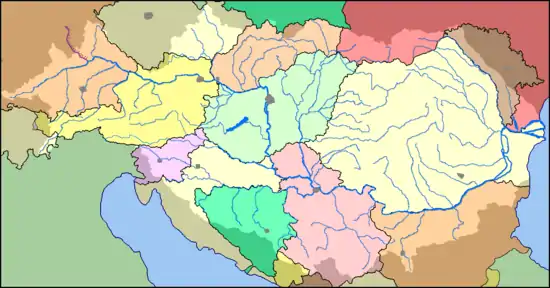

Danube(Czech: Dunaj, which empties into the Black Sea, does not itself reach the Czech territory (flowing only through neighbouring countries of Germany, Austria and Slovakia)Váh- Vlára
- Morava (German: March)
- Dyje (German: Thaya; originates at confluence of Moravská Dyje and Rakouská Dyje)
- Kyjovka
- Trkmanka
- Svratka
- Litava
- Svitava (below Brno)
- Punkva
- Křetínka
- Loučka (originates through confluence of Bobrůvka and Libochůvka)
- Bobrůvka
- Libochůvka
- Jihlava (in fact a tributary to Svratka but nowadays their confluence is completely within Nové Mlýny Reservoir, thus creating an impression of a direct tributary to Dyje)
- Rokytná
- Oslava
- Brtnice
- Jihlávka
- Jevišovka
- Moravská Dyje (Moravian Thaya)
- Rakouská Dyje (German Thaya, German: Deutsche Thaya)
- Velička
- Olšava (above Kostelany nad Moravou)
- Dřevnice (in Otrokovice)
- Rusava
- Moštěnka (above Kroměříž)
- Haná (above Kroměříž)
- Valová (this is the name for lower course of Romže after confluence with Hloučela)
- Romže
- Hloučela
- Blata
- Bečva (originates at confluence of Vsetínská Bečva and Rožnovská Bečva)
- Vsetínská Bečva (in Valašské Meziříčí)
- Senice
- Rožnovská Bečva (in Valašské Meziříčí)
- Vsetínská Bečva (in Valašské Meziříčí)
- Bystřice (in Olomouc)
- Trusovický potok (in Olomouc-Ćernovír)
- Oskava
- Třebůvka
- Rohelnice
- Mírovka (below Mohelnice)
- Moravská Sázava
- Březná
- Desná
- Merta
- Branná (in Hanušovice)
- Krupá
- Dyje (German: Thaya; originates at confluence of Moravská Dyje and Rakouská Dyje)
- tributaries to the Danube from SW borders of the country (i.e. rivers flowing from Bohemian Forest and Upper Palatinate Forest to Upper Austria and Bavaria)
.jpg.webp)

Große MühlRegenNaab- Nemanický potok (German: Schwarzach)
- Kateřinský potok (German: Pfreimd)
- Lesní Nába (German: Waldnaab)
Alphabetical list
- Bečva
- Berounka
- Botič
- Bystřice
- Bílina
- Čeladenka
- Chrudimka
- Cidlina
- Doubrava
- Elbe (Labe)
- Flöha (Flájský potok)
- Freiberger Mulde (Moldavský potok)
- Gottleuba (Rybný potok)
- Hluchová
- Jevišovka
- Jihlava
- Jizera
- Kamenice
- Klabava
- Klejnárka
- Liběchovka
- Loděnice
- Litavka
- Lomná
- Lusatian Neisse (Lužická Nisa)
- Lužnice
- Lučina
- Malše
- Mandau (Mandava)
- Metuje
- Mírovka
- Morava
- Moravice
- Mrlina
- Nežárka
- Oder (Odra)
- Ohře
- Olza (Olše)
- Opava
- Orlice
- Oslava
- Ostravice
- Otava
- Petrůvka
- Ploučnice
- Pšovka
- Punkva
- Radbuza
- Rolava
- Sázava
- Střela
- Svatava
- Svitava
- Svratka
- Teplá
- Thaya (Dyje)
- Úhlava
- Úpa
- Úslava
- Vltava
- Volyňka
- White Elster (Bílý Halštrov, German: Weiße Elster)
- Želivka
Notes
- 144,055 km² including part of basin extending to Germany, Austria and Poland
- 28,090 km² including part of basin extending to Germany and Austria
- 5,614 km² including part of basin extending to Germany
- the remaining area of the Czech Republic after subtracting of Elbe and Oder drainage basins
- 26,658 km² including part of basin extending to Austria and Slovakia
- 13,419 km² including part of basin extending to Austria
- at mouth (if within Czech Republic) or at national border
- Total length of Vltava and Elbe courses combined within Czech territory is 530 km
- Total length of the Elbe (including territory of Germany) is 1165 km
- Total length of the Morava (including territory of Slovakia and Austria) is 353 km
- before confluence with Thaya
- Total length of the Ohře (including territory of Germany) is 316 km
- Total length of the Thaya (including territory of Austria and Deutsche Thaya) is 306 km
- before confluence with Jihlava
- Total length of the Lužnice (including territory of Austria) is 208 km
- Total length of the Oder (including territory of Poland and Germany) is 861 km
.jpg.webp)
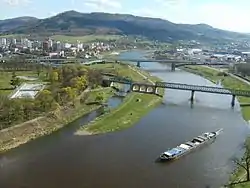



.jpg.webp)
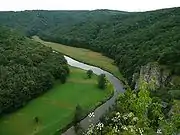
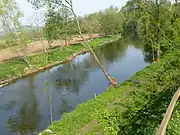

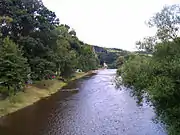


.jpg.webp)
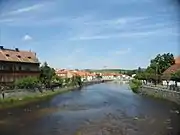


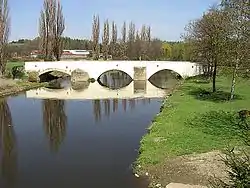
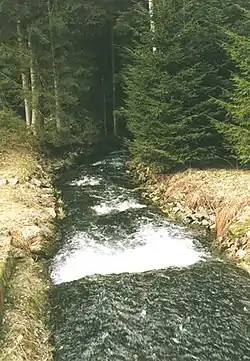



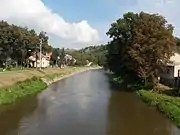

.jpg.webp)






